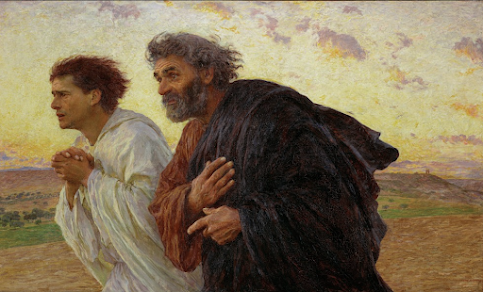On the first day of the week,
Mary of Magdala came to the tomb early in the morning,
while it was still dark,
and saw the stone removed from the tomb.
Mary Magdalene came to the tomb that Sunday still in darkness, expecting death. But what she found instead she was not immediately able to process.
“They have taken the Lord from the tomb,
and we don’t know where they put him.”
The empty tomb was shocking, but it did not immediately move her to faith. The crucifixion had been horrific, and had traumatized those who witnessed it. Mary Magdalene seemed prepared to imagine that condition of the tomb was to explained as one final insult in that series of painful events. Neither her love for Jesus nor the evidence of the empty tomb were enough to make her invent stories about what she wished were true. We are allowed to see her and the other disciples being slow to believe precisely so we can realize that they didn't fabricate their stories. The fact that these accounts don't shy away from the doubt of the witnesses is proof that the authors weren't writing simply to glorify themselves, weren't simply telling the story they wished they could tell. They were in fact witnesses, often confused, fluctuating between doubt and belief. Even though they encountered the evidence that none of their human suppositions could explain, enough to quickly discredit the grave robber hypothesis, they did not immediately jump to conclusions that something miraculous had occurred.
When Simon Peter arrived after him,
he went into the tomb and saw the burial cloths there,
and the cloth that had covered his head,
not with the burial cloths but rolled up in a separate place.
The evidence of the empty tomb should have pointed back toward Jesus own words that he would rise again on the third day. But it was as though the only way that the trauma of the cross could be truly answered was in encounter with the risen Lord himself. Everyone, it seemed, was ready to cling to their sorrow and sadness and to identify with their pain and tragedy. It would take meeting the risen Jesus to restore their own hearts.
For they did not yet understand the Scripture
that he had to rise from the dead.
The first witnesses of the resurrection were unlikely ones, women and poor fishermen from Galilee, with messy testimony. But it is all the more believable because of it. When we see the way in which the encounter of the women and the disciples with the risen Lord moved them from fear to faith, especially when their own doubts seemed insurmountable, no other explanation suffices. In the preaching of the early Church we can hear this tone of certainty as a striking contrast their early attempts at tenuous humanly manufactured explanations.
This man God raised on the third day and granted that he be visible,
not to all the people, but to us,
the witnesses chosen by God in advance,
who ate and drank with him after he rose from the dead.
It wasn't just one encounter that would have been easy to misidentify. Rather, Jesus came to them again and again until it was enough to convince even those among them with the deepest doubts. By doing this he was preparing them to preach to the world, and it as as a consequence of this preaching that we ourselves believe.
He commissioned us to preach to the people
and testify that he is the one appointed by God
as judge of the living and the dead.
Sometimes we find it difficult to believe in the resurrection in a truly concrete and life-changing way. We have seen enough sorrow and tragedy in the world as to be traumatized, more ready to believe the human explanation tending toward despair, and to doubt any hope that hints at more. If this describes us then the Easter proclamation is especially important for us to hear: Christ is risen! He desires to encounter us in our hearts and to reveal his resurrection to us every bit as much as he revealed it to those first chosen witnesses. He does this because we too are meant to be witnesses. But we can only do this with what is meant to be the central part of our story, the resurrection, solidly fixed in our hearts, at every moment shaping how we see the world.
Think of what is above, not of what is on earth.
For you have died, and your life is hidden with Christ in God.
When Christ your life appears,
then you too will appear with him in glory.
If the death of Jesus was not an insurmountable evil then surely there is hope enough for all times and places, enough comfort for all who mourn, and joy in abundance to make up for any past affliction.
The right hand of the LORD has struck with power;
the right hand of the LORD is exalted.
I shall not die, but live,
and declare the works of the LORD.

No comments:
Post a Comment